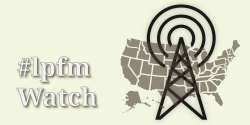The count of new LPFMs inched forward this week with ten more, bringing the total to 1350. Several of these are in major metroplexes, including Sacramento, Denver, Los Angeles and Seattle.
The Open Media Foundation received the construction permit in Denver. That group is a media and technology nonprofit that helps socially conscious organizations use media, including video and web, as well as assisting with branding and messaging. The Open Media Foundation also offers training in media production to youth and adults.
In its application the foundation said that its station will broadcast locally produced arts, music, culture, discussion, news and analysis. Some planned programs include “Spotlight on Students,” to produced by Denver-area middle and high school students, and broadcasts of Colorado State Legislature sessions.
In Seattle the KMIH.org Radio Booster Club will have a station sited right in the heart of the city, just east of downtown. The group reached a settlement agreement with competing applicant Sand Point Arts and Cultural Exchange to share time on 101.1 FM, with KMIH taking midnight to noon, and Sand Point taking noon to midnight, seven days a week.
A settlement has also been reached in the Easy Bay of California, though the FCC has not yet approved it. The Alameda Unified School District, Poor Magazine and Alameda Community Radio reached a time share agreement, while the fourth applicant in that group voluntarily dismissed its application.
MX Fight in Philadelphia
In the Philadelphia area, the Social Justice Law Project of the local NAACP chapter has filed a petition to deny against four applicants in the same MX group: G-Town Radio, Historic Germantown Preserved, Germantown Life Enrichment Center, and Germantown United Community Development Corporation. The SJLP alleges that
“we have evidence that the first applicant listed above–G-Town Radio–explicitly directed the other three parties to file their applications so that these multiple applications could then be combined for G-Town Radio’s benefit[.]”
Such coordination, SJLP says, violates FCC rules.
The SJLP reports that its executive director had conversations with representatives of the three Germantown organizations, “where they confirmed that their applications were originally submitted according to an arrangement orchestrated by the entity G-Town Radio[.]” SJLP also says there is “significant overlap and relationship among board members and staff across these four organizations,” which would appear to violate the condition that an LPFM applicant may not have a significant interest in another application or broadcast station.
The SJLP has an application in that same MX group, competing for 92.9 FM. Another applicant in the group, Nueva Esperanza, has filed a similar petition to deny.



